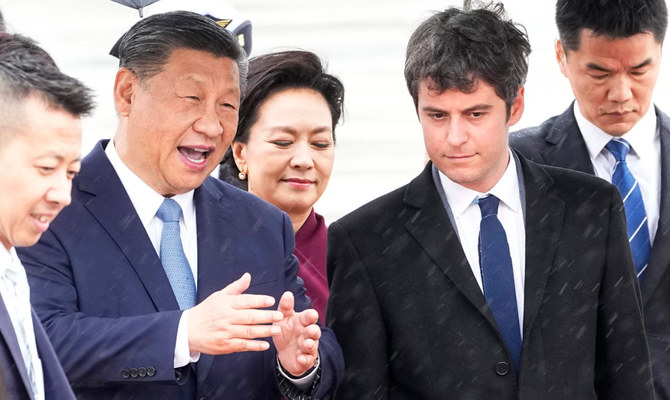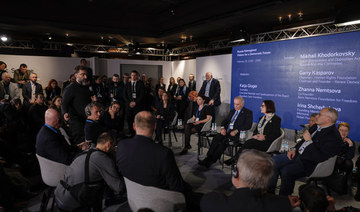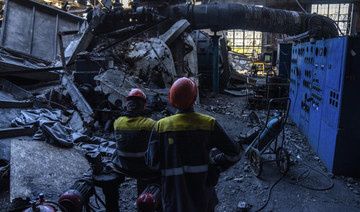DIENG PLATEAU, Central Java: With the pandemic making life harder in the Indonesian economy, authorities and a few locals in a mountainous region of Central Java are taking the novel approach of setting up “selfie decks,” a new fad attracting tourists to the area.
The high-rise platforms offer an undisrupted and panoramic view of the landscape and serve as the perfect backdrop for visitors to take Instagram-worthy photos.
One example is a selfie deck in Sigemplong hamlet in Batang regency, built in 2017 by a group of young locals, with one member saying that they capitalized on the idea after realizing its “potential.”
“We saw there was a potential to attract visitors and generate some economic activities for the hamlet, so we were motivated to pave a track up to the hill. We couldn’t build anything modern in terms of material due to the access here at that time, so we constructed this observatory deck out of wood logs that are available here,” Edy Wirawan, a member of the Pandu Nusantara youth group, told Arab News.
The towering photo deck sits at the top of Derikan Hill, which is about 1,500 meters above sea level and part of the Dieng mountain range.
It offers visitors a backdrop of Java’s northern coastline through the day, while tourists can focus on the lights of the surrounding towns at night.
The idea seems to have clicked, and the photo deck went viral after authorities paved the road with asphalt, providing easier access to the Dieng Plateau.
It garnered more attention after tourists began posting photos and videos on social media on the new road at the ridge of the hill, which offers views of the mountain range along with terraced cabbage and potato fields.
The tower can host up to 10 people at a time, but is now closed for renovation, while another one in the shape of a ship has been set up next to it.
With the spot attracting more visitors, other locals began building more selfie decks along the road and makeshift wooden booths to sell drinks and snacks from.
However, some locals soon complained that the structures were blocking the view of the mountainous landscape.
“Honestly, we are concerned that the booths are blocking the view, but there’s not much we can do to stop it at the moment. It has been a dream, however, for the locals to have our region be accessible and have many visitors. It provides more income for locals,” Wirawan said.
He added that the group was considering coordinating with local authorities to assign specific spots for the booths to avoid blocking the view. Still, he said that they “might not do anything much for those built on the privately-owned fields.”
It is the same situation on the other side of the mountain, along the winding road from the provincial capital of Semarang to the plateau, where patches of land on the fringe of tea plantations at the foot of Mount Sindoro have been cleared to construct resting areas with selfie platforms.
In Dieng Plateau, local environmentalists and nature-based tourism activists have seen their scenic natural surroundings disrupted by selfie platforms, including some in two of the most popular destinations in Dieng, the Sikidang Crater and the Batu Ratapan Angin viewing point.
Aprilianto, the owner of a coffee shop on the rim of the plateau, told Arab News that there are too many selfie decks in Dieng.
“We have had too many visual pollutants in Dieng. The natural view here is already beautiful as it is and it has its own way to show its charm to visitors, but we have been meddling with it,” he said.
A mountain ranger and tour guide in Dieng, Dwi Yono, said a photo spot for pictures with angel wings as a backdrop was “out of touch” with the natural surroundings.
“It was just too much. We don’t need these photo spots when we already have abundant natural scenic views,” he said.
However, the crater’s management was quick to respond to local concerns and persuade photo spot operators to dismantle the backdrops after what they described as “long and persuasive dialogue” earlier this year.
“It is clear now, there are no more selfie decks around the crater. Apart from being illegally constructed inside a tourism destination managed by the local authorities, we have had complaints from visitors that the decks were disrupting the crater’s landscape,” Sri Utami, head of the Dieng Banjarnegara Tourism office, told Arab News.
Dwi Yono said the photo spots provide local farmers additional income during weekends.
“However, it would be better if authorities encouraged local businesses to develop more experience-based tourism activities for visitors to explore the plateau, instead of constructing modern facilities that are out of touch with the region,” Yono said.
Indonesian ‘selfie decks’ get bricks and bouquets from locals
https://arab.news/pe2r9
Indonesian ‘selfie decks’ get bricks and bouquets from locals

- The high-rise platforms offer an undisrupted and panoramic view of the landscape and serve as the perfect backdrop for visitors to take Instagram-worthy photos
- However, some locals have complained that the structures were blocking the view of the landscape
Exiled Russian historian rallies fellow emigrants in dark times

- Tamara Eidelman is part of a group of exiled anti-war Russian public intellectuals and cultural figures who are rebuilding their careers abroad
- More than 800,000 Russians are estimated to have left the country in just the past two years after Russia invaded Ukraine
WASHINGTON: Russian dissident historian Tamara Eidelman was on vacation in Greece when Moscow’s tanks rolled into Ukraine in February 2022 and she realized that she would not be going back to her home country.
With her single suitcase, Eidelman, 65, flew to Portugal, where her daughter had been living, and began a new life in exile.
“I am operating under the assumption that I will not return. I am building my life in Portugal,” Eidelman, who has over 1.6 million followers on her history channel on YouTube, told AFP. “I want to come back... but if I sit every day thinking ‘When will it finally happen?’ I will go mad.”
Eidelman, who was declared a “foreign agent” by the government in Moscow, is part of a group of exiled anti-war Russian public intellectuals and cultural figures who are rebuilding their careers abroad.
While they cater to a large diaspora — more than 800,000 Russians are estimated to have left the country in just the past two years — unlike the previous waves of emigration from Russia’s calamities, they are able to continue speaking to those who stayed via social media, despite growing government restrictions.
“I think it’s one of the advantages of today’s emigration, if there can be any advantages, that our ties with our homeland have not been ruptured so drastically,” Eidelman, who wore a pin in the colors of the Ukrainian flag on her black blouse, said before a lecture in a community center outside Washington.
“Today there is an opportunity to exchange ideas. And, despite all the bans, inside Russia you can still access what is being done by those who emigrated. It is extremely valuable, it must be used and cherished.”

While exiles are unlikely to have a significant impact on political life inside Russia, “they can be the keepers of ideas, the centers of expertise and civic education,” according to Alexander Morozov, a political analyst and lecturer at Charles University in Prague.
When political change occurs, “Those who have retained trust and their symbolic capital can play a role in Russia’s renewal,” he wrote in a recent paper.
During her first few months in Portugal, Eidelman, who worked as a history teacher at a prestigious Moscow school for more than 30 years before becoming an editor, blogger and public speaker, kept herself busy looking for a place to live, reassembling her YouTube team and signing up for Portuguese lessons.
But she would catch herself thinking she was there on a brief visit and that she needed to buy a bottle of Port wine to bring back to Moscow to her mother and friends. Then it hit her.
“I felt a tremendous weight pressing on me when things had settled down a little and I realized that I am going to be in this wonderful, beautiful country for a long time,” she said. “Of course, (President Vladimir Putin’s) regime will collapse, but I don’t know if I will be around to see it.”
Since the start of Russia’s full-scale invasion, Eidelman’s YouTube channel has ballooned from some 500,000 followers to 1.63 million and a team of 30 people, with lectures on Russian, Ukrainian and world history — as well as a special presentation on Putin’s assault on democracy, which she delivered in a T-shirt that read “No Putin No War.”
“I want to express my unconditional support for Ukraine in this war and I believe that all its territories, including Crimea, must be returned to it,” Eidelman told AFP, referring to the Black Sea peninsula that Russia annexed in 2014.
During her lecture in an auditorium of several hundred Russian speakers titled “The Judgment of History,” Eidelman examined the painful questions of countries’ and societies’ culpability and responsibility for crimes from ancient Greece to Nazi Germany — with the clear undertone of Russia’s war in Ukraine.
Prosecuting those who committed direct crimes against Ukraine will not be enough, Eidelman suggested in her interview with AFP.
“I believe that there cannot be collective responsibility, that a whole people cannot be guilty,” she told AFP. “But at the same time, there must be... moral responsibility, responsibility before one’s conscience.”
Alina, a 39-year-old Russia-born quality control manager drove more than eight hours to Washington from the southern US state of Tennessee with her husband and two children to hear Eidelman speak.
To Alina, Russia’s invasion of Ukraine is “a crime against a neighboring country, but it’s also a crime against my own country because crimes are being committed in the name of people like me, who don’t agree with it.”
In these tragic times, Eidelman’s talk was a breath of fresh air, Alina said.
“When I listen to her lectures, I believe that there is — if not hope, then at least some light ahead for you to follow,” she said. “You get the feeling that you are not alone in all of this, even though physically you live apart from everyone.”
md/bgs/caw
Trump says Biden administration uses ‘Gestapo’ tactics: US media

- The “Gestapo” comment came as the campaign has begun heating up, and it follows several other Trump remarks that critics have said are dangerously inflammatory, including calling political rivals “vermin” and comparing immigrants to “animals”
WASHINGTON: Former president Donald Trump has sharpened his allegation that his Democratic successor has weaponized the US justice system against him, comparing Joe Biden’s tactics to those of Hitler’s Gestapo, American media reported Sunday.
The Republican 2024 presidential candidate made the remark during a private meeting Saturday with top party leaders and wealthy donors at his Mar-a-Lago resort in Florida, according to a recording provided to US media by one donor.
In a 90-minute speech, Trump accused the Democrats of “running a Gestapo administration,” referring to the secret police force in Nazi Germany. “It’s the only way they’re going to win,” he said.
The “Gestapo” comment came as the campaign has begun heating up, and it follows several other Trump remarks that critics have said are dangerously inflammatory, including calling political rivals “vermin” and comparing immigrants to “animals.”
His comments in Mar-a-Lago brought loud applause from the audience, which included a number of potential vice presidential picks, according to Politico.
He again lashed out at the prosecutors who have brought four separate court cases against him, including the hush-money trial now taking place in New York.
Trump denounced what he claimed was a “witch hunt” hatched by the Democratic administration to eliminate his key presidential rival.
The White House, which has denied any involvement in the legal cases, denounced Trump’s comments on Sunday.
“Instead of echoing the appalling rhetoric of fascists, lunching with Neo Nazis, and fanning debunked conspiracy theories that have cost brave police officers their lives, President Biden is bringing the American people together around our shared democratic values and the rule of law,” spokesman Andrew Bates said.
Biden’s campaign also responded, saying the Republican’s angry remarks confirmed “what we already knew: Trump’s campaign is about him. His fury, his revenge, his lies, and his retribution.”
Anti-war protesters leave USC after police arrive, while Northeastern ceremony proceeds calmly

- Israel has killed more than 34,000 Palestinians, according to Gaza’s Health Ministry
WASHINGTON: Students protesting the war in Gaza abandoned their camp at the University of Southern California early Sunday after being surrounded by police and threatened with arrest, while Northeastern University’s commencement began peacefully at Boston’s Fenway Park.
Developments in both places were being watched closely following scores of arrests last month — 94 people at USC in Los Angeles and about 100 at Northeastern in Boston.
Dozens of Los Angeles Police Department officers arrived about 4 a.m. at USC to assist campus safety officers. The university had warned of arrests on social media and in person. Video showed some protesters packing up and leaving, while officers formed lines to push others away from the camp as it emptied out. The university said there were no reports of any arrests.
USC President Carol Folt said it was time to draw a line because “the occupation was spiraling in a dangerous direction” with areas of campus blocked and people being harassed.
“The operation was peaceful,” Folt wrote in an update. “Campus is opening, students are returning to prepare for finals, and commencement set-up is in full swing.”
USC earlier canceled its main graduation ceremony while allowing other commencement activities to continue.
At the Northeastern commencement Sunday, some students waved small Palestinian and Israeli flags, but were outnumbered by those waving the flags of India and the US, among others. Undergraduate student speaker Rebecca Bamidele drew brief cheers when she called for peace in Gaza.
The Associated Press has tallied about 2,500 people arrested at about 50 campuses since April 18, based on its reporting and statements from universities and law enforcement.
Arrests continued apace over the weekend. At the University of Virginia, there were 25 arrests Saturday for trespassing after police clashed with protesters who refused to remove tents. At the Art Institute of Chicago campus, police cleared a pro-Palestinian encampment hours after it was set up Saturday and arrested 68 people, saying they would be charged with criminal trespass.
ARRESTS IN VIRGINIA
In Charlottesville, Virginia, student demonstrators began their protest on a lawn outside the school chapel Tuesday. Video on Saturday showed police in riot gear and holding shields lined up on campus, while protesters chanted “Free Palestine.”
As police moved in, students were pushed to the ground, pulled by their arms and sprayed with a chemical irritant, Laura Goldblatt, an assistant professor who has been helping the demonstrators, told The Washington Post. The university said protesters were told that tents were banned under school policy and were asked to remove them.
Virginia Attorney General Jason Miyares told Fox News on Sunday the police response was justified because students had been warned repeatedly to leave, were violating the school’s conduct code, and that outsiders who were not students provided protesters with supplies like wooden barriers.
“We’ve seen folks that are not students show up in riot gear with bull horns to direct the protesters on how to flank our officers,” Miyares said.
He said some had put bear spray into water bottles and thrown them at officers.
It was the latest clash in weeks of protests and tension at US colleges and universities.
Tent encampments of protesters urging universities to stop doing business with Israel or companies they say support the war in Gaza have spread in a student movement unlike any other this century. Some schools reached agreements with protesters to end the demonstrations and reduce the possibility of disrupting final exams and commencements.
DEMONSTRATIONS AMID COMMENCEMENT
The University of Michigan was among the schools bracing for protests during commencement this weekend, as were Indiana University, Ohio State University and Northeastern. More ceremonies are planned in the coming weeks.
In Ann Arbor, there was a protest at the beginning of the event at Michigan Stadium. About 75 people, many wearing traditional Arabic kaffiyehs along with their graduation caps, marched up the main aisle toward the stage.
They chanted “Regents, regents, you can’t hide! You are funding genocide!” while holding signs, including one that read: “No universities left in Gaza.”
Overhead, planes pulled banners with competing messages. “Divest from Israel now! Free Palestine!” and “We stand with Israel. Jewish lives matter.”
Officials said no one was arrested, and the protest didn’t seriously interrupt the nearly two-hour event, attended by tens of thousands of people, some of them waving Israeli flags.
OTHER PROTESTS CONTINUE
At Indiana University, protesters urged supporters to wear their kaffiyehs and walk out during remarks by school President Pamela Whitten on Saturday evening. The Bloomington campus designated a protest zone outside Memorial Stadium, where the ceremony was held.
At Princeton University in New Jersey, 18 students began a hunger strike to try to push the university to divest from companies tied to Israel. Students at other colleges, including Brown and Yale, launched similar hunger strikes this year before the more recent wave of demonstrations.
The protests stem from the conflict that started Oct. 7 when Hamas militants attacked southern Israel, killing about 1,200 people, mostly civilians, and taking roughly 250 hostages. Vowing to destroy Hamas, Israel launched an offensive in Gaza that has killed more than 34,500 Palestinians, about two-thirds of them women and children, according to the Health Ministry in the Hamas-ruled territory. Israeli strikes have devastated the enclave and displaced most of its inhabitants.
China’s Xi in France for Macron talks on Ukraine

- Tuesday will see Macron take Xi to the Pyrenees mountains to an area he used to visit as a boy for a day of less public talks
PARIS: Chinese President Xi Jinping arrived in France Sunday on a state visit hosted by Emmanuel Macron where the French leader will seek to warn his counterpart against backing Russia in the conflict over Ukraine.
Xi’s arrival for the visit marking 60 years of diplomatic relations between France and China heralded the start of his first trip to Europe since 2019, which will also see him visit Serbia and Hungary.
But Xi’s choice of France as the sole major European power to visit indicates the relative warmth in Sino-French relations since Macron made his own state visit to China in April 2023 and acknowledges the French leader’s stature as an EU powerbroker.
The leader of the one-party Communist state of more than 1.4 billion people, accompanied by his wife Peng Liyuan, was welcomed under umbrellas at a drizzly Paris Orly airport by Prime Minister Gabriel Attal.
Xi is to hold a day of talks in Paris on Monday — also including EU Commission chief Ursula von der Leyen — followed by a state banquet hosted by Macron at the Elysee.
Tuesday will see Macron take Xi to the Pyrenees mountains to an area he used to visit as a boy for a day of less public talks.
In an op-ed for Le Figaro daily, Xi said that he wanted to work with the international community to find ways to solve the conflict sparked by Russia’s invasion of Ukraine, while emphasising that China was “neither a party nor a participant” in the conflict.
“We hope that peace and stability will return quickly to Europe and intend to work with France and the entire international community to find good paths to resolve the crisis,” he wrote.
A key priority of Macron will be to warn Xi of the danger of backing Russia, with Western officials concerned Moscow is already using Chinese machine tools in arms production.
Beijing’s ties with Moscow have, if anything, warmed after the invasion and the West wants China above all not to supply weapons to Russia and risk tipping the balance in the conflict.
“It is in our interest to get China to weigh in on the stability of the international order,” said Macron in an interview with The Economist published on Thursday.
Macron also said in the interview that Europe must defend its “strategic interests” in its economic relations with China, accusing Beijing of not respecting the rules on international trade.
But he acknowledged in an interview with the La Tribune Dimanche newspaper that Europeans are “not unanimous” on the strategy to adopt as “certain actors still see China essentially as a market of opportunities” while it “exports massively” to Europe.
The French president had gladdened Chinese state media and troubled some EU allies after his 2023 visit by declaring that Europe should not be drawn into a “bloc versus bloc” standoff between China and the United States, particularly over democratic, self-ruled Taiwan.
China views the island as part of its territory and has vowed to take it one day, by force if necessary.
Rights groups are urging Macron to bring up human rights in the talks, accusing China of failing to respect the rights of the Uyghur Muslim minority and of keeping dozens of journalists behind bars.
“President Macron should make it clear to Xi Jinping that Beijing’s crimes against humanity come with consequences for China’s relations with France,” said Maya Wang, acting China director at Human Rights Watch.
The group said human rights in China had “severely deteriorated” under Xi’s rule.
A crowd of protesters on Sunday unfurled a Tibetan flag at a demonstration in Paris, accusing Xi of being a “dictator” and wanting to erase local culture in the Tibet region, an AFP reporter said. Paris police put the number of protesters at two thousand.
However analysts are skeptical that Macron will be able to exercise much sway over the Chinese leader, even with the lavish red carpet welcome and a trip to the bracing mountain airs of the Col du Tourmalet over 2,000 meters (6,560 feet) above sea level on Tuesday.
The other two countries chosen by Xi for his tour, Serbia and Hungary, are seen as among the most sympathetic to Moscow in Europe.
“The two core messages from Macron will be on Chinese support to Russia’s military capabilities and Chinese market-distorting practices,” said Janka Oertel, director of the Asia program at the European Council on Foreign Relations.
“However, both messages are unlikely to have a significant impact on Chinese behavior: Xi is not on a mission to repair ties, because from his point of view all is well.”
Niger receives new Russian advisers, equipment

- US Defense Secretary Lloyd Austin indicated on Thursday that Russian troops were now installed at a Nigerien air base near the Niamey airport that also houses US troops
NIAMEY: New Russian military advisers and military equipment have arrived in Niger, according to state television in the African country that wants US forces to leave.
A first set of about 100 Russian advisers arrived in Niger on April 10, along with air defense systems.
Two military transporters arrived on Saturday, according to Tele Sahel that said Russia has now sent three cargo planes of military material and instructors in the past month.
The Africa Corps, seen as the successors of the Wagner paramilitary group in Africa, confirmed the instructors’ arrival in a posting on the group’s Telegram account.
FASTFACT
US Defense Secretary Lloyd Austin indicated that Russian troops were now installed at an air base near the Niamey airport that also houses US troops.
On Saturday, it said more trainers, equipment, and food products had arrived.
US Defense Secretary Lloyd Austin indicated on Thursday that Russian troops were now installed at a Nigerien air base near the Niamey airport that also houses US troops.
Niger’s military regime, which took power in a July 2023 coup, expelled French troops based in the country and then denounced a military cooperation agreement with the US.
It said this had been “unilaterally imposed” by Washington.
Washington agreed in April to withdraw roughly 1,000 soldiers from the country.
Negotiations are underway between the United States and Niger about the withdrawal.
US forces have a key drone base near Agadez, built at a cost of about $100 million.
Niger’s military leaders have moved closer to Russia, as have Mali and Burkina Faso, which also have military coup leaders and are fighting rebel groups affiliated with Al-Qaeda and Daesh.
In April, Idrissa Soumana Maiga, head of the private L’Enqueteur newspaper, was imprisoned after an article mentioned the “presumed” installation of Russian listening devices in official buildings.





















